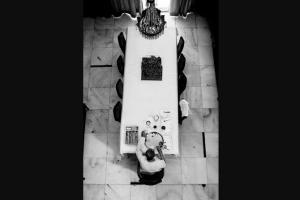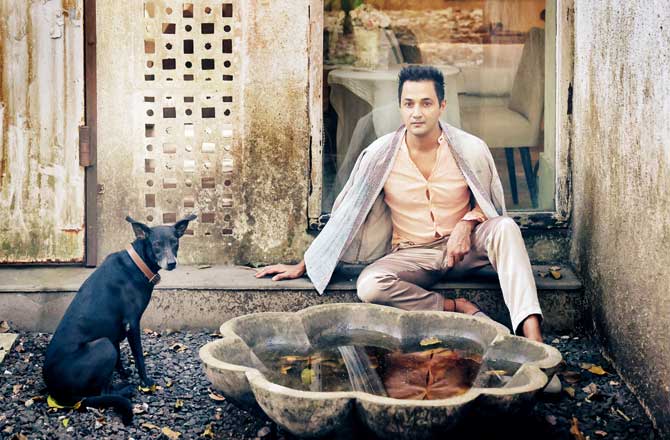Goa-based writer Siddharth Dhanvant Shanghvi reveals how his new memoir, an account of death and grief, allowed him to honour the lives of those who brought him joy

This shot shows the author;s father, Dhanvant, at the head of a long, lonely table. The photograph was taken after he recovered from cancer. Pics/Siddharth dhanvant Shanghvi
There is no single way to define loss, especially in the year of a pandemic, where the inevitability of death has been exacerbated.
ADVERTISEMENT
Author Siddharth Dhanvant Shanghvi, who has experienced a decade of grief, losing first his mother, Padmini, his father Dhavant, and then his dachshund Bruschetta in 2018, has seen death from close quarters and the radiating isolation and loneliness that come with it. The pandemic, he says, made him more "curious" about it.

Padmini, his mother, who suffered from rheumatoid arthritis, spent her last few years in bed. "Growing up, I watched Padmini hobble around the house, then use a cane stick which was later replaced with a metal walker. A black creaking wheelchair was prelude to the few years before she became entirely bed-bound," Shanghvi writes in the book
In his just released book, Loss (HarperCollins India), a memoir of death and grief, he goes back in time to a fuller home, before examining his losses with "surgical detachment," one essay at a time. At some point in the book, Shanghvi asks, "When do we recover? What line must be crossed, what wound must be camouflaged by skin? Is there a date, time, an omen—a black bird must wheel through the house, perhaps?" In an email interview, he says, "You simply live yourself into the answer. It's ineffable; epiphanies don't arrive with a brass band. It happens on an idle Tuesday, you're driving home from work, you find you're hurting less, your pleasures overweigh your forfeitures. You don't shed the pain—it's not a schoolbag that can be set aside at the end of the day. You look your loss in the eye, as if it were the mentor of your transformation. You can look loss in the eye, because you have paid the price of admission: You have suffered. You own it now."
Edited excerpts from the interview.
This book takes us on a journey of coping with loss and death—one you witnessed in your family. Writing is said to be cathartic. Did the book stem from a similar space?
One of the questions I wanted to try and answer is: How do you want to die? The pandemic heightened this curiosity, perhaps for all of us. Loss, an examination of my parent's deaths, and the death of Bruschetta, my friend, did not emerge from a place of 'writing as catharsis,' but as writing as a means to answer life's questions. Kafka said that the meaning of life is that it stops. It stops, sure, so the more meaningful endeavour is to understand the time leading up to it, if only to meet a better death. Writing Loss did not help me make sense of grief; it allowed me to measure joy, and honour the lives who brought me joy. Do you remember that line by [Gabriel García] Marquez? "I discovered to my joy, that it is life, not death, that has no limits." I learned this from writing Loss.

Bruschetta was with Shanghvi for nine years. The dachshund was diagnosed with cancer in June 2018, and the doctors gave him eight weeks. He died a day after the launch of Shanghvi’s last book, in November that same year
Death, you write, makes us look at people and life differently. In your words, it "exposes the living as they are". Would you say that death is life-changing?
Certainly, it was clarifying, because you can see who the people are around you. There are people you go to parties with; there are friends who show up at the crematorium. After every death in my life some people—either relatives or friends—went away. I could blame them, of course, but now I honour them for their absence, feeling gratitude for the waves of death that swept them out of my life. If life is a great writer, death is a fine editor.
Your essays in a way encapsulate the story of the Shanghvi family, challenged by the impending going-away of a few members. For a society like ours, where grieving is so private and personal, did you see yourself struggling to write this?
The struggle was to tell the story without making it about the 'Shanghvi family,' but to gauge the spiritual nourishment the book might bring to her reader. The book was never in service to the author, but its reader. The challenges were how much information to share—you don't want to write one of those horrible American books that unravel your secrets. Instead, you want to write a memoir, which holds the deceased in balance, with fairness. Oddly enough, while Loss started as a means to cope with grief it turned into a measure of the love I had for my parents and for Bruschetta. I did not always have this when they had been living—when you are in relationship with someone, it is always full of static. But when they have dropped their form and you have only their spirit to contend with, that is a novel kind of relationship to embark on. That is something to look forward to, no one tells you when it happens.

Siddharth Dhanvant Shanghvi. Pic courtesy/Rohit Chawla
For a better part of the last 10 years of his life, your father was also grieving the loss of a partner. Your sisters were, too. Having been around them, do you feel the loss, which was of the same kind that you were all experiencing, was also different from each other's?
Absolutely, because the way my sister Nehal remembers my father, Dhanvant, is different from how I do. I had a tense relationship with my father, while my sister considered him as her source of strength, the cardinal person in her life. I came to love my father more after he had dropped his body as I could appreciate his generosities without the grey noise of our relationship. I now think to myself: How wonderful that appreciation replaced grief!
Your relationship with your pet is remarkably endearing. When Bruschetta passed on, you slept for two days straight, and the loss, as you mention, was probably more difficult to deal with than your parents'. Yet, you stuck to the "fiction of good manners," having cancelled on a literary festival, saying you sprained your leg. Looking back, do you think the festival organiser would have understood, had you told him the truth.
I was afraid that the note would be lost in the narrative of "his dog died and he cancelled his book tour—who does he think he is?" Orhan Pamuk said that dogs do speak, but only to those who know how to listen. I wasn't sure if the festival organiser might have been that sort of person. But who is to say? Because after Loss came out, a number of readers told me that the essay about Bruschetta helped them resolve something specific about the death of a pet. The essay helped them see their own friend as I saw Bruschetta, as a person with tremendous dignity. We see our pets as our psychological inferiors because their personhood is contained in different form. If anything, they are less cruel extensions of ourselves, with an instinct for love that we can only aspire to.
Keep scrolling to read more news
Catch up on all the latest Mumbai news, crime news, current affairs, and a complete guide from food to things to do and events across Mumbai. Also download the new mid-day Android and iOS apps to get latest updates.
Mid-Day is now on Telegram. Click here to join our channel (@middayinfomedialtd) and stay updated with the latest news
 Subscribe today by clicking the link and stay updated with the latest news!" Click here!
Subscribe today by clicking the link and stay updated with the latest news!" Click here!






